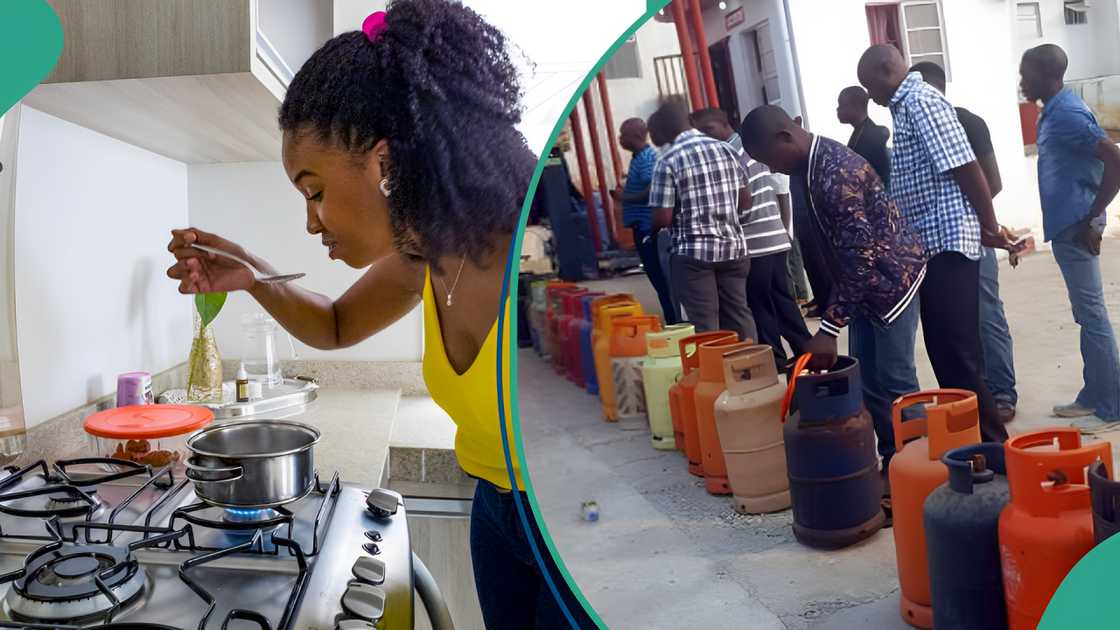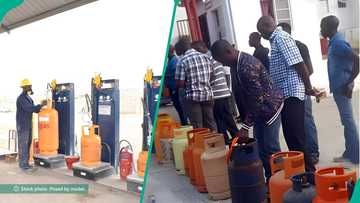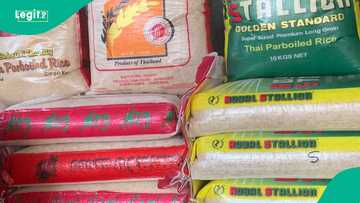N3,600 Per Kg: NNPC Boss Explains Truth Behind Soaring Cooking Gas Prices
- The Group Chief Executive Officer of the NNPC, Bayo Ojulari, has blamed the hike in cooking gas prices on the suspended PENGASSAN strike
- The NNPC boss disclosed that the strike disrupted loading and supplies, leading to artificial scarcity in parts of the country
- He assured that things would soon return to normal as the union has since called off the strike
Pascal Oparada, a reporter for Legit.ng, has over ten years of experience covering technology, energy, stocks, investment, and the economy.
The Group Chief Executive Officer of the Nigerian National Petroleum Company Limited (NNPC), Bayo Ojulari, has shed light on the mystery behind the sudden jump in the price of Liquefied Petroleum Gas (LPG), also known as cooking gas, which recently hit ₦3,600 per kilogramme in parts of the country.
Speaking to State House correspondents after visiting President Bola Tinubu at the Presidential Villa, Abuja, Ojulari said the surge was not a result of new market fundamentals but a temporary distortion caused by an industrial strike.

Source: Getty Images
Why did cooking gas price jump?
According to him, the recent strike by the Petroleum and Natural Gas Senior Staff Association of Nigeria (PENGASSAN) brought loading and distribution to a standstill for several days, disrupting supply lines and triggering an artificial scarcity that sent prices soaring.
“The increase you saw was relatively artificial because for the period of the strike, movements and loading were delayed by about two to three days,.
“As things normalise, it takes a while for distribution to catch up again,” Ojulari explained.
However, supply disruption wasn’t the only factor — market opportunism played a key role.
Retailers exploited crisis - NNPC boss Ojulari
The Nigerian Tribune said Ojulari didn’t mince words in blaming some opportunistic retailers for worsening the situation. He accused gas marketers of deliberately hiking prices during the brief disruption to cash in on public panic.
“As you know, in Nigeria, people take the opportunity. With that delay, some of the people who had existing reserves decided to increase prices,” he said.
Industry experts say this kind of speculative behaviour is common in Nigeria’s downstream energy market, where even short-term supply issues can cause prices to spiral out of control.
Strike linked to Dangote Refinery labour dispute
The NNPC boss further linked the disruption to the nationwide strike by PENGASSAN, which was sparked by the dismissal of Nigerian workers at the Dangote Refinery.
The industrial action halted fuel and gas operations across the country, creating ripple effects on prices and supply chains.
The strike was eventually suspended on October 1, following the intervention of the federal government.
The Dangote Group later agreed to redeploy the affected workers, clearing the path for operations to resume and for the gas market to stabilise.
Relief on the horizon?
Ojulari assured Nigerians that the current gas price spike is temporary and would ease in the coming weeks as normal distribution resumes.
“Now that things have normalised, prices should return to what they were before the strike,” he said confidently.
Consumers, however, remain sceptical as many are still paying inflated prices across Lagos, Abeokuta, Abuja, and other cities.

Read also
Cooking gas scarcity hits major cities as prices surge over 80%, dealers blame Dangote Refinery
Analysts warn that unless monitoring agencies clamp down on profiteering, the effect of the strike could linger longer than expected.
Cooking gas prices skyrocket by 80%
For now, the NNPC boss’s explanation offers some relief, but for millions of Nigerian households struggling to refill their cylinders, the wait for prices to drop continues.
A prior report by Legit.ng disclosed that Nigerians are facing acute cooking gas scarcity, which has sent prices soaring 80%.
The development, which has made households revert to firewood and primitive cooking methods, affected several Nigerian cities.
Dangote Refinery’s angle
Queues surfaced at several refilling plants, with operators taking advantage to hike prices.
Meanwhile, others blamed the Dangote Refinery breakdown for the scarcity and subsequent hike in prices.

Source: Facebook
The refinery’s petrol-producing unit reportedly broke down, with experts saying repairs could last till the end of October.
Experts have 3 reasons for cooking gas scarcity
Legit.ng earlier reported that the price of refilling liquefied petroleum gas (LPG), also known as cooking gas, skyrocketed in recent days due to scarcity in major cities such as Lagos, Ibadan, and Abeokuta.
Residents in Lagos over the weekend paid as much as ₦3,200 per kilogramme, a 190% increase compared to the previous price of N1,100 per kg.
The new prices released by many dealers mean it would cost N32,000 to refill a 10kg cylinder of cooking gas.
Proofreading by Kola Muhammed, copy editor at Legit.ng.
Source: Legit.ng




